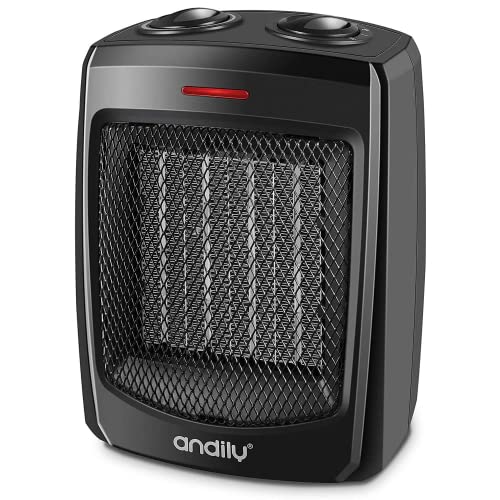There are many things that are often present in the garage. Usually, you will have a toolbox, a garage vacuum, a workbench, power tools, and an air compressor, among others. Yet maybe the most useful one is the garage heater.
There are all sorts of garage heaters. A larger garage heater will usually produce more BTUs but also cost more to buy. This chart shows the number of watts, average cost, BTUs, average cost to run, and room size the heater can handle.
| Number of Watts | Average Price | BTUs (10W = 34.1 BTU) | Cost To Run (2021 US – 13¢ per KWH) | Room Size (low Insolation 12.5w per sq. ft.) |
|---|---|---|---|---|
|
1000W Heater |
$25-$150 |
3,410 BTU |
13¢ per hr. (24hr-$3.12) |
80 Sq. ft. |
|
2000W Heater |
$100-$300 |
6,820 BTU |
26¢ per hr. (24hr-$6.24) |
160 Sq. ft. |
|
3000W Heater |
$100-$300 |
10,230 BTU |
39¢ per hr. (24hr-$9.34) |
240 Sq. ft. |
|
4000W Heater |
$100-$400 |
13,640 BTU |
52¢ per hr. (24hr-$12.48) |
320 Sq. ft. |
|
5000W Heater |
$100-$600 |
17,050 BTU |
65¢ per hr. (24hr-$15.60) |
400 Sq. ft. |
|
10000W Heater |
$200-$800 |
34,100 BTU |
$1.30 per hr. (24hr-$31.20) | 800 Sq. ft. |
Garage heaters can come in a variety of shapes and sizes. Some are wall-mounted, some sit on a table or floor, while others hang from the ceiling. If you are wondering which ones you might want to get keep reading for information on several options to choose from.
What is a Garage Heater?
Also known as the shop heater, the primary function of this appliance is to provide spot heating that is needed in your garage. This is an essential investment for the winter if you live in a place that is basically cold year-round. They are known for their energy efficiency, allowing such to be used without worrying that electricity will shoot up. Also, as it will be mentioned later, there are different sources of power, including gas or kerosene.
Depending on the specific brand and model of the garage heater that will be chosen, their power and functionality can vary. More often than not, however, their power will range from 1,500 to 5,600 watts. With the latter, they will be enough for heating space with a size of 150 to 560 square feet.
Types of Garage Heaters
Garage heaters can be categorized in different ways, and one would be through the way they are installed. In this case, the following are the options that you will have:
AD
- Fixed Garage Heaters: This means that the garage heater is mounted, usually in the ceiling or wall. They are wired and they cannot be moved once they are already installed unless you unscrew it. They are also usually more powerful compared to their counterparts.
- Portable Garage Heaters: As the name implies, this is a type of heater that is movable. You can adjust its position or bring it to any other indoor space that needs to be heated. They are excellent in terms of versatility, as they can be used in different places.
Meanwhile, garage heaters can also be categorized on the basis of their heating mechanism. In this case, the following are the options that you will have:
- Electric or Fan-Forced: Of all the types, this is perhaps the most popular. They are known for many benefits that they can deliver, specifically their ease of installation. First, electricity will be converted into heat. After this, the fan will draw cold air from the garage and then blow it again to create the heating effect. They are also known for the ability to heat quickly.
- Radiant: In the case of this type, it will provide spot heating. This means that the heat will be directed to a specific target. It does not warm the entire space. This is an excellent choice if you want to heat only a specific portion of the garage. However, you need to be always near it to feel the heat produced.
- Infrared: This uses innovative infrared wavelengths to produce heat. It does not come with a fan, which is beneficial because this means that it will not produce a loud noise. Similar to radiant heaters, it also directs the heat to a specific portion of the garage.
- Natural Gas, Diesel, or Kerosene: While the products that have been mentioned above use electricity as the main supply of energy, these models use gas. They are also portable since they do not require electricity. However, they usually have high risks, which is why caution must be observed in their use.
Essential Factors to Consider
As you try to look for the best garage heater, the following are some of the most important factors that should be taken into account:
- Power: This is one of the most important technical specifications that should be considered. Some garage heaters plug into a normal 120v outlet while others may need a 240v. The source of power or type of the heater will have an impact on how much power it draws from your circuit breaker panel.
- Size of the Garage: This is important to ensure the heating efficiency of the heater that you will purchase. If you have a large garage, you need a more powerful heater. If not, you will end up still suffering from a cold temperature.
- Installation: This is especially important for models that are fixed in a specific position. You should be able to install it in a snap. The manufacturer must provide comprehensive instructions to let you easily accomplish its assembly.
- Safety: Do not also forget to pay attention to the safety features that you can find in the product. This can provide you with peace of mind in its use. For instance, for portable models, it is good if it automatically switches off in case it trips. There should also be protected from overheating and the housing must stay cool, even with prolonged use.
Popular Picks on Amazon for Garage Heaters
If you are having a hard time deciding which one to choose, the following are the products you might want to consider.
1000 Watt Heaters
Here’s an example of a heater that uses about 1000 watts.
AD
Features:
- 120-volt
- 750-1500 watts
- ~60-120 Square Feet.
- ~2,557 – 5,115 BTU
- ~9.77¢ – 19.5¢ per hr.
1500 Watt Heaters
Here’s an example of a heater that uses about 1500 watts.
AD
Features:
- 120-volt
- 900–1500 watts
- ~300 Square Feet.
- ~5115 BTU
- ~11.7¢-19.5¢ per hr.
2000 Watt Heaters
Here’s an example of a heater that uses about 2000 watts.
AD
Features:
- 240-volt
- 2000 watts
- ~160 Square Feet.
- ~6,820 BTU
- ~26¢ per hr.
Another example is a heater that uses about 2000 watts.
AD
Features:
- 240-volt
- 2000 watts
- ~160 Square Feet.
- ~6,820 BTU
- ~26¢ per hr.
3000 Watt Heaters
Here’s an example of a heater that uses about 3000 watts.
AD
Features:
- 240-volt
- 3000-6000 watts
- ~240 – 480 Sq. Ft.
- ~10,230 – 20,460 BTU
- ~39¢ – 78¢ per hr.
Another example of a heater that uses about 3000 watts.
AD
Features:
- 240-volt
- 1500-3000 watts
- ~120 – 240 Sq. Ft.
- ~5,115 – 10,230 BTU
- ~19.5 – 39¢ per hr.
4000 Watt Heaters
Here’s an example of a heater that uses about 4000 watts.
AD
Features:
- 240-volt
- 4000 watts
- ~320 Sq. ft.
- ~13,640 BTU
- ~52¢ per hr.
Another example of a heater that uses about 4000 watts.
AD
Features:
- 240-volt
- 4000 watts
- ~320 Sq. ft.
- ~13,640 BTU
- ~52¢ per hr.
5000 Watt Heaters
Here’s an example of a heater that uses about 5000 watts.
AD
Features:
- 240-volt
- 5000 watts
- ~400 Sq. ft.
- ~17,050 BTU
- ~65¢ per hr.
Another example is a heater that uses about 5000 watts.
AD
Features:
- 240-volt
- 5500 watts
- ~448 Sq. ft.
- ~19,096 BTU
- ~72.8¢ per hr.
10000 Watt Heaters
Here’s an example of a heater that uses about 10000 watts.
AD
Features:
- 240-volt
- 10000 watts
- ~800 Sq. ft.
- ~34,100 BTU
- ~$1.30 per hr.
Another example is a heater that uses about 10000 watts.
AD
Features:
- 240-volt
- 10000 watts
- ~800 Sq. ft.
- ~34,100 BTU
- ~$1.30 per hr.
Conclusion
In sum, garage heaters can be a helpful investment if you work in the garage on cold days. This will help you to make use of a space that is often not utilized efficiently.
You can turn the garage into a workshop or use it for any other purpose. Even when just working with basic car repairs, the addition of a heater will be a great thing, as it can make you more productive.
Installing a 120v heater is easy, while a 240v heater may require special wiring and possibly a new 240v circuit breaker panel.
Best wishes for a warm and comfortable garage the next time you are out there working on your next project.
Thanks for visiting Drivinglife.net
References
houseneeds.com – Website unavailable
findanyanswer.com – Website unavailable














